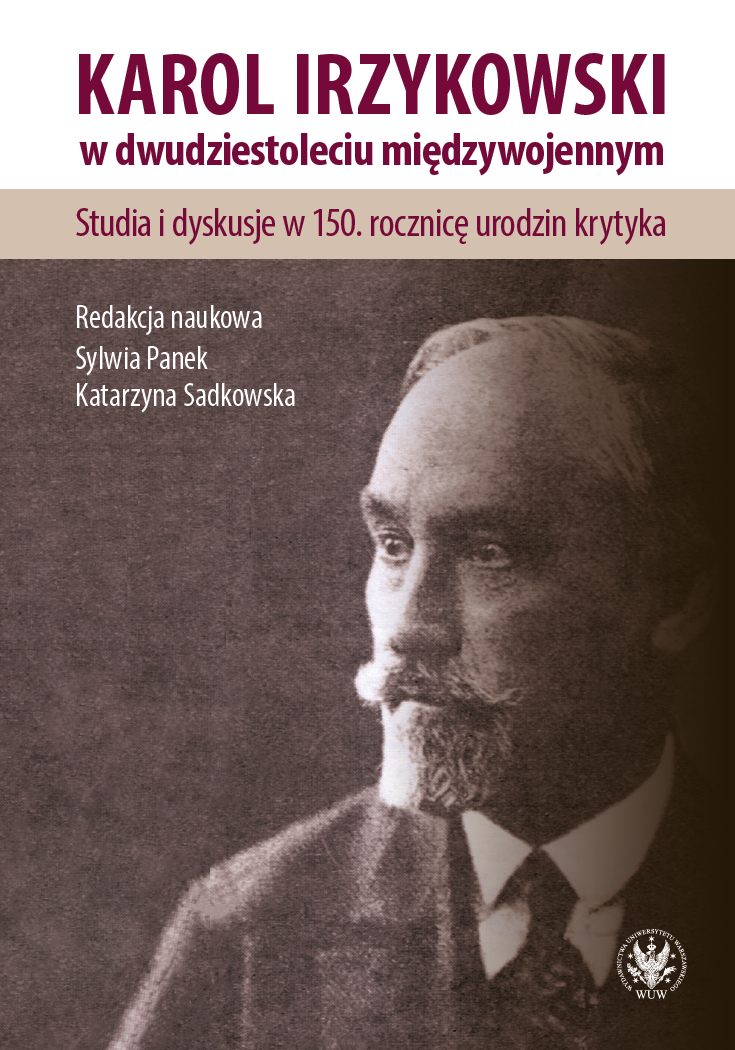
We kindly inform you that, as long as the subject affiliation of our 300.000+ articles is in progress, you might get unsufficient or no results on your third level or second level search. In this case, please broaden your search criteria.


This essay offers an analysis of the rhetoric of the dispute between Irzykowski and Witkacy that takes into account both artists’ strong statements of opinions as an indication of their hidden recurring resentments. In the essay, the dispute is interpreted as a duel between two unrecognised intellectuals accusing each other of anachronisms and honouring themselves with a label of a precursor. What is more, the author of the essay points out how the nature of this psychomachy-like dispute manifests itself with a constant violation of by and large accepted ethical norms of an artistic dispute of which the two were eager proponents.
More...

The article is a detailed analysis of Karol Irzykowski’s review of the poetic collection "Łąka" (1920) by Bolesław Leśmian. It reconstructs the criteria used by the critic to evaluate Leśmian’s book and studies Irzykowski’s discourse built upon an antinomy between “dobre wiersze” (“good poems”) and “wierszęta” (“poor little poems”). As the analysis reveals, Irzykowski’s argumentation served to a significant degree as a self explicationof critic’s personal aesthetic experience.
More...

The article shows how the attitude of Julian Przyboś to Karol Irzykowski developed and evolved. As a young poet of the Cracow avant-garde, Przyboś perceived Irzykowski as a recognized critic and a writer of great authority. In his views, he particularly valued the critical attitude towards the Young Poland movement, the rejection of derivativeness, and respect for the originality of literary achievements. The dispute with the outstanding critic, who accurately pointed to the weaknesses of avant-garde aesthetic ideas, was an opportunity for Przyboś to clarify and summarize his own views, different from Irzykowski’s and Peiper’s. The disputes between Karol Irzykowski and Julian Przyboś reflected ideas clashing in the interwar period and constituted an essential element of literary life.
More...

Representation of sensual experience is vital for the expression of Karol Irzykowski’s intellectualism. The paradoxical victory of sensual testimony over the mind’s claim is the result of the rejection of Young Poland’s legacy by this literary critic. Between the two world wars (1918–1939) as a rationalist-idealist Irzykowski prefers ratio, spirit and idea over materialism.
More...

From Irzykowski’s theatrical reviews emerges a special image of their author – it is a man faithful to literature, drama as a literary work, and especially its mental content. This faithfulness gives a special ethical value to his statements about theatre. Irzykowski is able to stand against the general reviewers in defense of the playwrights criticised by them wrongly (as he believes); some other time he is capable of responding viciously and hurling abuse at an author who speaks ill about his profession. He can also criticize the most famous theatre director of that time – Leon Schiller. In the era of domination of the so-called reformers of the theatre, whose writings he knows, his approach to theatre from the perspective of a dramatic work gives his reviews a special value of other modernity.
More...

The chapter examines texts of a film critic Andrzej Włast published in the “Ekran i Scena” magazine and a book by Karol Irzykowski, whose "The Tenth Muse: Aesthetic Aspects of Cinema" (1924) is the first theoretical study exploring the cinema as art in the Polish language. Both Włast and Irzykowski addressed issues of film movement and montage, film genres, stardom, and others, analyzing contemporary film production in Europe and the USA. It is interesting to follow parallels and differences in points of view of the two critics and writers to show the early stage of film theory in Poland and the ways of discussing the language of cinema, its status as an art form and as part of popular culture.
More...

The article presents Karol Irzykowski’s film theory from the perspective of a viewer and participant of the newly emerging visual culture. Until now scholars have only treated Irzykowski as a pioneer of Polish film theory, overlooking his role as a regular at film screenings as well as an active reviewer of the cinematic repertory of his day. Szulik draws on Irzykowski’s reviews in “Wiadomości Literackie” (1924–1925) in order to show that his theory was rooted in his participation in and reflection on popular culture.
More...


The purpose of this sketch is to present the most important features of the model of “clercism” according to Irzykowski, especially those that prove its originality and distinctiveness. The starting point is an analysis of what qualities Irzykowski looked for in potential “clercs” and from what groups of intellectuals he chose potential adepts. The point of arrival is an attempt to distinguish Irzykowski’s individual vision among other models of clercism.
More...

The aim of the article is to characterize the situation of Karol Irzykowski in the interwar period and his paradoxical – because it took place in the circumstances of the critic’s extraordinary activity – loneliness. The frustration and bitterness of the critic, which finds diary documentation, is shown as the result of social and professional disappointments (the backstage of parting with literary magazines, the way Irzykowski functioned at PAL, failures on the literary awards market, the unsatisfactory work of a parliamentary stenographer). The dialectic of isolation and engagement is presented as a consequence of 1) Irzykowski’s personality traits, 2) the concept of literary criticism, based on the postulate of merciless unmasking of mental prejudices and developed by him already in the Young Poland period, 3) the necessary response to the epistemological and ethical foundations of the clerc’s worldview.
More...